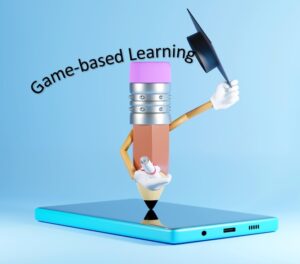Game-based Learning
Game-based learning (GBL), in partnership with social emotional learning (SEL) skills and strategies, can be effective for improving attendance, engaging learners, and motivating students to become self-disciplined. Special needs, particularly autistic students, are provided an opportunity for joint attention and a common interest with other classmates, creating an inclusive learning environment. GBL helps students who are unaware of social cues and lack balance to learn the lessons that might be misunderstood or forgettable in traditional modes of teaching and learning.
Let’s say your 3rd grader is a self-motivated, self-disciplined student. He or she has a classmate who requires constant redirection. This intrusion negatively impacts the learning environment for both students. Educators have been using games in the classroom to motivate and deepen understanding for decades. But for change to occur, we must meet our kids where they are. Most are on video games. When students are engaged and motivated, they want to be in school; they want to behave as expected; they want to learn. Perhaps, GBL can be an intervention for YTS’ Mental Health Intervention services. To learn more, visit Video Games in School. To listen to Charisse’s podcast on gamification, click on the image above.
We created Jump Anywhere in the World (JAW), a seven-series mobile video game that supports SEL by providing: conflict resolution strategies, mindfulness practices, and empathy, equity, diversity options to impact players’ gaming decisions. Each game is set on one of the seven continents, engaging players in a captivating, action-filled journey of adventure and survival. Players will battle mystical wildlife while helping the characters work through personal hurdles and challenges. They are then rewarded within the game for using SEL skills and strategies to make positive choices. The SEL competencies we reinforce are:
Self-awareness:
- Developing interest and a sense of purpose
- Practicing mindfulness techniques
- Identifying positive traits and triggers in oneself
Social awareness:
- Demonstrating empathy and compassion
- Demonstrating diversity, equity, and inclusion of others
- Expressing gratitude
Self-management:
- The ability to identify, express, and regulate emotions
- The ability to direct thoughts and actions toward achieving goals
- Using planning and organizational skills
- Practicing self-compassion to manage negative feelings
Relationship:
- Communicating effectively
- Resolving conflict
- Expressing empathy and perspective
- Demonstrating teamwork and collaboration
Decision-making:
- Evaluating the consequences of one’s actions
- Understanding how decisions affect you and others
- Developing critical thinking skills that promote ethical behavior



